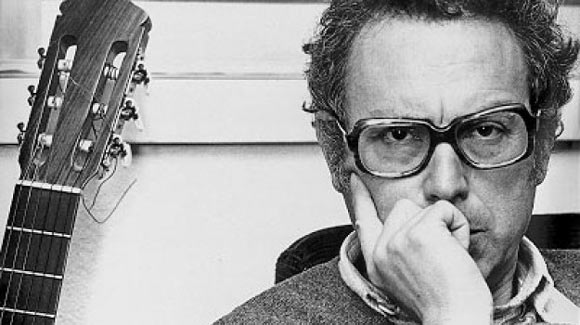
Jose Afonso Des Santos, often referred to as Zeca Afonso, was an internationally renowned folk musician and composer, especially in the Portuguese Community. Born in 1929 in the Portuguese town of Aveiro, Zeca lived out his earlier years in the streets of Aveiro, Portuguese Angola and Mozambique, before finally settling down in Coimbra. The overarching embellishments of Afonso’s records demonstrated a revival of the political environment through peaceful, yet revolutionary measures, all through spreading his music amongst the masses. Afonso’s music predominantly focused on Left-wing political sidelines and aspirations, in particular the revolutionary activities against the Right-wing dictatorships that were finally overthrown in 1974, having subjected Portugal to hardcore dictatorial forms of regimes throughout the 1960s and early 1970s.
After spending the first few years of his teenage life studying Philosophy and History in the Associacao Academica De Coimbra and the University of Coimbra in the late 1940s and early 1950s, he started teaching and making music simultaneously after 1955. His first record, Fados De Coimbra, was released in 1956. However, it was only by 1958 when he especially became disturbed and obsessed with the fraudulent and corrupt attributes of Portuguese politics, and felt the need to address this through inculcating related themes in to his music. Everything subsequent to his works so far would contribute tremendously to the ultimate success of the Carnation Revolution of 1974. From the 1960s onwards, he began collaborating with several musical groups that focused particularly on the ‘Fados’ or ‘Fate’ genre of music, one that was very popular at the time and concerned music ensconcing and instilling a very vibrant emotional and melancholic feeling in the listener. This period saw the likes of albums Balada do Outono (1960) and Baladas e Cancoes (1964) come out on the musical scene, with special focus on the classical and Portuguese guitars as the main instrumental elements in the song progression.
However, much to the despair of Afonso, simply producing music and assembling support for a grand cause like a political revolution would be harder than what he had expected in his youth. He witnessed this first-hand when the military regime of the time expelled Afonso from teaching in public arenas, simply because of his Leftist orientation. This, however, failed to dispel his obsession for reform and only made him more popular amongst the oppressed. He instead, started singing more often amongst the political figures of the day, in the various student protest rallies and also began teaching privately. After the advent of the Labor Union movements close to 1969, Afonso produced a few other popular albums such as Contos Velhos Rumos (1969) and Cantigas do Maio (1971), which had the inevitable effect of making him even more popular amongst the Communist sections of the political scene. Perhaps, his most famous song was ‘Grandola, Vila Morena’, which drew upon nationalist elements and connotations in the lyrics and attracted affiliations from larger political groups, that were struggling for political freedom from illegitimate authority and brute force. Having been performed first at the Lisbon Coliseum in 1974, the song is still heard on radios and television in the streets of rural Portugal today.
The world has seldom seen musicians whose legacies fail to wither away, even after their unforeseen demises. Zeca Afonso can rightfully be included in this category of musicians, as his music collection is still held to the highest of accolades not just in Portugal, but all around the world. In his three-decade-long career, Afonso produced close to 30 albums, all carrying within the signature themes of political revolution, Left-wing agendas and most important of all, peace.